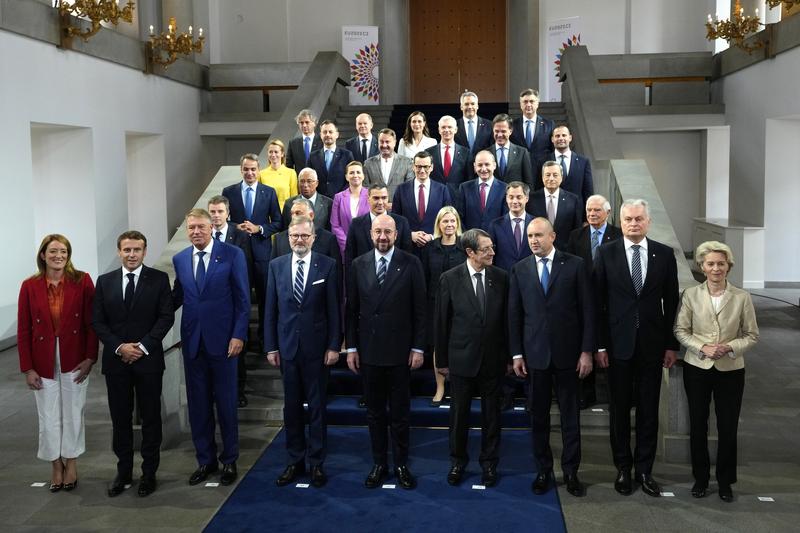 European Union leaders pose for a group photo during an EU Summit at Prague Castle in Prague, Czech Republic, Oct 7, 2022. The EU leaders converged on Prague Castle Friday to try to bridge significant differences over a natural gas price cap as winter approaches and the Russia-Ukraine conflict fuels a major energy crisis. Front row left, to right, European Parliament President Roberta Metsola, French President Emmanuel Macron, Romania's President Klaus Werner Ioannis, Czech Republic's Prime Minister Petr Fiala, European Council President Charles Michel, Cypriot President Nicos Anastasiades, Bulgaria's President Rumen Radev, Lithuania's President Gitanas Nauseda and European Commission President Ursula von der Leyen. (PETR DAVID JOSEK / AP)
European Union leaders pose for a group photo during an EU Summit at Prague Castle in Prague, Czech Republic, Oct 7, 2022. The EU leaders converged on Prague Castle Friday to try to bridge significant differences over a natural gas price cap as winter approaches and the Russia-Ukraine conflict fuels a major energy crisis. Front row left, to right, European Parliament President Roberta Metsola, French President Emmanuel Macron, Romania's President Klaus Werner Ioannis, Czech Republic's Prime Minister Petr Fiala, European Council President Charles Michel, Cypriot President Nicos Anastasiades, Bulgaria's President Rumen Radev, Lithuania's President Gitanas Nauseda and European Commission President Ursula von der Leyen. (PETR DAVID JOSEK / AP)
PRAGUE – Divisions between European Union leaders over capping gas prices and national rescue packages resurfaced on Friday, with Poland accusing Germany of "selfishness" in its response to a winter energy crunch caused by Russia's special military operation in Ukraine.
A majority of EU states has asked Brussels to propose a cap on gas prices, but they disagree on the details. Some capitals seek a broad cap on all gas trades and import contracts, while others prefer a limited cap in the power sector only.
The cap is among a range of proposals and initiatives by European states to cope with plummeting gas supplies from Russia, which once supplied 40 percent of Europe's needs, and rocketing prices. They have eased off this year's peaks but remain more than 200 percent higher than at the start of September 2021.
READ MORE: EU to include energy self-sufficiency in recovery plans
Germany, Denmark and the Netherlands oppose a cap, worried that it would make it difficult to buy the gas their economies need and dampen any incentive to reduce consumption.
The negotiations are ongoing. And they will be intense because... it is our goal to support... energy providers with it, so that the supply of gas does not decrease.
Karl Nehammer, Chancellor, Austria
Arriving for an EU summit at Prague Castle, Austrian Chancellor Karl Nehammer said any price cap must be devised and implemented in a way that supports power suppliers.
"The negotiations are ongoing. And they will be intense because... it is our goal to support... energy providers with it, so that the supply of gas does not decrease," he said.
Czech Prime Minister Petr Fiala specifically mentioned capping prices of gas used for electricity production, while Latvia's Krisjanis Karins said a cap would be "grand" if the bloc could still ensure supplies from producers.
Luxembourg's Prime Minister Xavier Bettel cautioned that the EU should be careful not to harm its position in global markets by driving sellers away with an unattractive cap, because "maybe we (then) have a price cap but no energy".
The summit's chairman, European Council President Charles Michel, said no decisions were expected on Friday but hoped the discussion among leaders would lead to a deal when they next meet on Oct 20-21.
Poland fumes
Polish Prime Minister Mateusz Morawiecki criticized Germany over what he sees as lavish spending of 200 billion euros ($196 billion) in subsidies to shield consumers and businesses from soaring energy costs.
"German selfishness must be put away in the cupboard," he said, repeating concerns about a fiscal divide separating wealthy countries that can afford to spend heavily on domestic subsidies and those that cannot.
ALSO READ: Europe steps up energy security bid
But Belgium's Alexander De Croo said big national support packages were necessary in the absence of any pan-EU action.
 An employee works at Bulgartransgaz gas compressor station near Ihtiman, Bulgaria, May 12, 2022. (REUTERS/STOYAN NENOV/FILE PHOTO)
An employee works at Bulgartransgaz gas compressor station near Ihtiman, Bulgaria, May 12, 2022. (REUTERS/STOYAN NENOV/FILE PHOTO)
"We could not just leave people coping with the cold weather," he told reporters. "But the real solution is that we act together in the market and then those big (national) support packages won't be necessary anymore."
Economy Commissioner Paolo Gentiloni warned that amid a difficult economic environment "the only thing we cannot afford in the current geopolitical context is division, fragmentation... a division between European countries".
With EU gas storages 90 percent full, European Commission chief Ursula von der Leyen said the bloc was well prepared for winter.
The leaders will also discuss in Prague providing more financial and military support to Ukraine.


